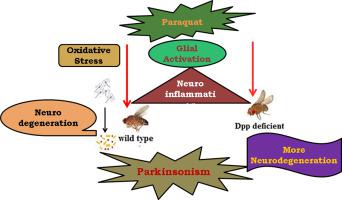当前位置:
X-MOL 学术
›
Pestic. Biochem. Phys.
›
论文详情
Our official English website, www.x-mol.net, welcomes your
feedback! (Note: you will need to create a separate account there.)
Reduced Dpp expression accelerates inflammation-mediated neurodegeneration through activated glial cells during altered innate immune response in Drosophila
Pesticide Biochemistry and Physiology ( IF 4.2 ) Pub Date : 2020-11-01 , DOI: 10.1016/j.pestbp.2020.104680 Shauryabrota Dalui , Soumya Chatterjee , Priyobrata Sinha , Arindam Bhattacharyya
Pesticide Biochemistry and Physiology ( IF 4.2 ) Pub Date : 2020-11-01 , DOI: 10.1016/j.pestbp.2020.104680 Shauryabrota Dalui , Soumya Chatterjee , Priyobrata Sinha , Arindam Bhattacharyya

|
The progression of neurodegenerative disease is very complex biological process and the molecular crosstalk of inflammatory cytokines during neurodegeneration is associated with multiple cascade signalling. Few evidences suggest that environmental toxin, Paraquat (PQ) administration activates the microglia and intensify the release of proinflamatory cytokines during progression of Parkinson''s disease (PD) but the proper aetiology remained unknown. However, the fundamental role of anti-inflammatory molecule Decapentaplegic (Dpp), homologue of the secreted mammalian Transforming growth factor-β (TGF-β) signalling molecule during neurodegeneration of invertebrate fly model is yet to establish. To elucidate the molecular processes during early stage of Parkinson's disease, we observed neuro-toxin plays a determining role in the increased vulnerability to a particular PQ exposure that is attended by decreased lifespan, severe locomotor deficits, and more loss of dopaminergic (DA) neuron in PQ-treated Dpp deficient fly than wild type (WT). Simultaneously, activated microglia induced the inflammatory response with the release of pro-inflammatory and anti-inflammatory cytokine in Drosophila during neurodegeneration. Moreover, neuro-toxin exposure altered the expression of innate immune genes in both WT and mutant fly compared to the respective PQ-treated flies. Interestingly, PQ exposure reduced the expression of innate immune genes in mutant fly compared to WT. It may indicate that PQ exposure had broken down the immune defence response in mutant fly than WT whereas, without PQ exposure the innate immune tolerance level was higher in fly with reduced Dpp expression than WT. Thus, we observed the conserve anti-inflammatory factor TGF-β may exhibit a crucial defensive role during inflammation mediated neurodegeneration in invertebrate Drosophila melanogaster.
中文翻译:

在果蝇先天免疫反应改变期间,Dpp 表达减少通过激活的神经胶质细胞加速炎症介导的神经变性
神经退行性疾病的进展是非常复杂的生物过程,神经退行性疾病过程中炎性细胞因子的分子串扰与多个级联信号传导有关。很少有证据表明环境毒素、百草枯 (PQ) 给药会在帕金森病 (PD) 的进展过程中激活小胶质细胞并加剧促炎细胞因子的释放,但正确的病因仍然未知。然而,抗炎分子 Decapentaplegic (Dpp),分泌的哺乳动物转化生长因子-β (TGF-β) 信号分子的同系物在无脊椎动物苍蝇模型的神经变性过程中的基本作用尚未确定。为了阐明帕金森病早期的分子过程,我们观察到神经毒素在增加对特定 PQ 暴露的脆弱性中起着决定性的作用,与野生型相比,PQ 处理的 Dpp 缺陷蝇的寿命缩短、严重的运动缺陷和多巴胺能 (DA) 神经元丢失更多。 )。同时,活化的小胶质细胞在神经变性过程中通过释放促炎和抗炎细胞因子在果蝇中诱导炎症反应。此外,与相应的 PQ 处理果蝇相比,神经毒素暴露改变了 WT 和突变果蝇中先天免疫基因的表达。有趣的是,与 WT 相比,PQ 暴露降低了突变果蝇中先天免疫基因的表达。这可能表明 PQ 暴露比 WT 破坏了突变果蝇的免疫防御反应,而,在没有 PQ 暴露的情况下,果蝇的先天免疫耐受水平更高,Dpp 表达降低比 WT。因此,我们观察到保守的抗炎因子 TGF-β 可能在无脊椎动物黑腹果蝇的炎症介导的神经变性过程中发挥关键的防御作用。
更新日期:2020-11-01
中文翻译:

在果蝇先天免疫反应改变期间,Dpp 表达减少通过激活的神经胶质细胞加速炎症介导的神经变性
神经退行性疾病的进展是非常复杂的生物过程,神经退行性疾病过程中炎性细胞因子的分子串扰与多个级联信号传导有关。很少有证据表明环境毒素、百草枯 (PQ) 给药会在帕金森病 (PD) 的进展过程中激活小胶质细胞并加剧促炎细胞因子的释放,但正确的病因仍然未知。然而,抗炎分子 Decapentaplegic (Dpp),分泌的哺乳动物转化生长因子-β (TGF-β) 信号分子的同系物在无脊椎动物苍蝇模型的神经变性过程中的基本作用尚未确定。为了阐明帕金森病早期的分子过程,我们观察到神经毒素在增加对特定 PQ 暴露的脆弱性中起着决定性的作用,与野生型相比,PQ 处理的 Dpp 缺陷蝇的寿命缩短、严重的运动缺陷和多巴胺能 (DA) 神经元丢失更多。 )。同时,活化的小胶质细胞在神经变性过程中通过释放促炎和抗炎细胞因子在果蝇中诱导炎症反应。此外,与相应的 PQ 处理果蝇相比,神经毒素暴露改变了 WT 和突变果蝇中先天免疫基因的表达。有趣的是,与 WT 相比,PQ 暴露降低了突变果蝇中先天免疫基因的表达。这可能表明 PQ 暴露比 WT 破坏了突变果蝇的免疫防御反应,而,在没有 PQ 暴露的情况下,果蝇的先天免疫耐受水平更高,Dpp 表达降低比 WT。因此,我们观察到保守的抗炎因子 TGF-β 可能在无脊椎动物黑腹果蝇的炎症介导的神经变性过程中发挥关键的防御作用。









































 京公网安备 11010802027423号
京公网安备 11010802027423号